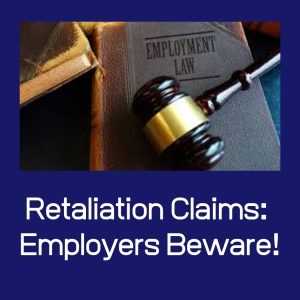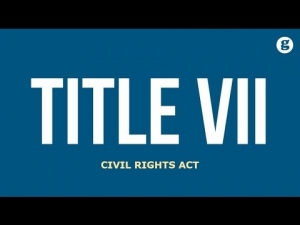Pennsylvania Human Relations Commission Adopts Specific Definitions of Protected Classes
Reprinted from the April 20th edition of The Legal Intelligencer. (c) 2023 ALM Media Properties. Further duplication without permission is prohibited.
On March 23, 2022, the Pennsylvania Human Relations Commission (“PHRC”) proposed new regulations to expand the definition of certain protected classes. The Amendments will create new Pennsylvania Code Sections at 16 Pa. Code §§ 41.201 – 41.207, and would expand the terms “sex”; “religious creed” and “race” for purposes of the Pennsylvania Humans Relations Act (“PHRA”) and the Pennsylvania Fair Educational Opportunities Act (“PFEOA”). The regulations were approved on December 8, 2022. The regulations are not yet in effect, but will become effective 60 days after publication in the Pennsylvania Bulletin.
The PHRA prohibits discrimination in employment because of race, color, religious creed, ancestry, age, sex, national origin or non-job related handicap or disability. 43 Pa. Stat. § 955(a). The regulations relating to the PHRA previously provided definitions only for the terms “pregnancy” and “disability due to pregnancy or childbirth”. 16 Pa. Code 41.101. The definition of the other protected classes was left to the PHRC’s guidance and cases interpreting the statute.
The amendments to Title 16 of the Pennsylvania Code would add a new subchapter, entitled “Protected Classes”, for the purpose of ensuring that all unlawful discriminatory practices proscribed by the PHRA and PFEOA are “interpreted and applied consistently”, and that all complaints filed with the PHRC “are investigated consistent with the rules outlined herein.” The regulations calls for liberal construction to accomplish the purpose of the PHRA and PFEOA.
The Third Circuit Addresses Employment Discrimination Cases
Reprinted with permission from the February 22nd edition of The Legal Intelligencer. (c) 2021 ALM Media Properties. Further duplication without permission is prohibited.
In Martinez v. UPMC Susquehanna, the United States Court of Appeals for the Third Circuit clarified the specificity required in pleading prima facie cases of discrimination in light of the holdings in Ashcroft v. Iqbal, 556 U.S. 662 (2009) and Bell Atlantic Corp. v. Twombly, 550 U.S. 544 (2007). The Third Circuit held that an age discrimination plaintiff need not plead the exact age or duties of the plaintiff’s alleged replacement in order to survive a motion to dismiss.
The plaintiff in the Martinez case appealed an order issued by the United States District Court for the Middle District of Pennsylvania dismissing the case for failure to state a claim under Iqbal and Twombly. The defendant, UPMC Susquehanna, employed the plaintiff, Dr. Martinez, as an orthopedic surgeon. Dr Martinez alleged in his complaint that UPMC Susquehanna terminated his employment and advised him that it was “moving in a different direction and his services were no longer needed.” UPMC Susquehanna also told Dr. Martinez that his termination had “nothing to do with his performance.” Dr. Martinez pleaded that he was seventy (70) years old, and that UPMC Susquehanna hired two doctors after his termination. The Complaint alleged that one of the hired physicians took over some of Dr. Martinez’s job duties, and that the second doctor was hired in response to a job posting for an orthopedic surgeon. Relevant to the Court’s analysis, Dr. Martinez alleged that both doctors were “significantly younger”, “less qualified,” and “less experienced” than Dr. Martinez.
Supreme Court Expands Title VII Protections to Prohibit Discrimination on the Basis of Sexual Orientation and Gender Identification
Reprinted with permission from the June 19th edition of The Legal Intelligencer. (c) 2020 ALM Media Properties. Further duplication without permission is prohibited.
The Supreme Court of the United States held in Bostock v. Clayton County, Georgia, 590 U.S. ___ (US 2020) that Title VII’s prohibition against discrimination on the basis of sex also bars discrimination on the basis of sexual orientation and gender identity. The Court’s opinion relies on the text of the statute, rejecting arguments from employers regarding the failure to specifically include gender identity or sexual orientation in the statue. The Supreme Court’s decision in Bostock is historic – it expands the protections of Title VII to sexual orientation and gender identity, protections previously denied. The Court’s ruling requires employers to update and modernize their policies and procedures, hiring practices, training and workplace culture.
RETALIATION CLAIMS: EMPLOYERS BEWARE!
Most employers these days are aware of the many workplace claims an employee might bring, including allegations of discrimination on account of race, color, religion, sex, national origin, sexual orientation, pay, age, or disability. Among other claims are those brought under the Fair Labor Standards Act (minimum wage, overtime) and the Family Medical Leave Act.
Employers paradoxically seem less aware of a retaliation claim an employee may bring. Paradoxically, because as reported by the Equal Employment Opportunity Commission (“EEOC”-the federal agency responsible for enforcing laws prohibiting employment discrimination), retaliation claims constituted the highest percentage of all charges filed in its fiscal year 2019.
Moreover, as discussed below, retaliation claims, by which an employee can obtain the same remedies as discrimination claims, are often easier for an employee to prove.
A recent opinion by the United States Court of Appeals for the Third Circuit (covering Pennsylvania) illustrates what an employee must do to state a case for retaliation and how an employer might defend the action.
Supreme Court Finds Title VII’S Requirement to File a Charge of Discrimination is not Jurisdictional
Reprinted with permission from the June 21st edition of The Legal Intelligencer. (c) 2019 ALM Media Properties. Further duplication without permission is prohibited.
In Fort Bend County v. Davis, 587 U.S. ___ (2019), the Court held that the requirement that a plaintiff in an employment discrimination case brought under Title VII, 42 U.S.C. § 2000e, et seq, file a charge of discrimination with the Equal Employment Opportunity Commission (“EEOC”) prior to filing a complaint in court is a procedural and not a jurisdiction requirement. Therefore, an employer’s failure to assert the absence of an appropriate charge of discrimination in a motion to dismiss results in a waiver of the defense. The Supreme Court’s decision resolves a split in the circuits regarding whether the requirement is jurisdictional, and highlighted the importance of the charge of discrimination and the motion to dismiss in employment discrimination cases.























